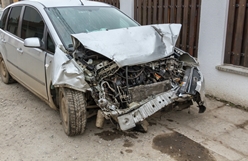
Head-on collisions are an especially terrifying and deadly type of automobile accident. According to the Insurance Institute for Highway Safety, head-on crashes were the number one cause of fatalities in auto accidents in 2015—causing 7,068 deaths—which was 54 percent of all deaths. Chances are that this trend is continuing because the number of fatal car accidents is increasing, not decreasing, annually. You are at risk of suffering serious injuries or death if a negligent driver hits you head on—no matter what speed your vehicles are going.
Why Are Head-On Collisions So Dangerous?
Head-on crashes occur when the front ends of two or more vehicles smash into each other. They are often more deadly because of the force of the impact when the vehicles collide. The collision is very abrupt—like crashing into a brick wall—and often the vehicles are traveling at a fast speed, making the impact even greater. As a result, victims often suffer debilitating injuries or die more frequently than in other types of crashes.
Common Causes of Head-On Car Accidents
It should be no surprise that driver negligence is the common theme in the many ways that motorists cause these crashes. After all, how else could a driver not see a vehicle right in front of him with enough time to get out of its way? Common reasons drivers cause these crashes include:
- Wrong way wrecks. If a driver is driving the wrong way on a one-way street or a highway entrance or exit ramp, a head-on collision is extremely likely. Often other negligent behaviors, such as drowsy or drunk driving, also contribute to this unsafe driving behavior.
- Crossing the centerline. A driver could cross into the centerline for many reasons. For example, he could lose control of his vehicle when speeding or when not driving slow enough for the weather conditions.
- Drowsy driving. When a driver is drowsy or falls asleep behind the wheel, he can easily veer into oncoming traffic. Recent studies have found that driving when drowsy can be as dangerous as driving when drunk.
- Speeding. The combination of speeding and hitting another vehicle head on almost guarantees that the victims will suffer catastrophic injuries or die.
- Taking a curve too fast. When a driver speeds around a curve, his chances of losing control of his vehicle and crashing into oncoming vehicles increases greatly.
- Impaired driving. When a driver is intoxicated in general, his reaction times are slower, he is drowsy, and his general driving skills are impaired. This can cause him to make poor decisions, such as mistakenly going the wrong way on a road or falling asleep at the wheel—with a head-on collision the tragic result.
- Distracted driving. If a driver is eating, drinking, talking on a cell phone, or texting, his eyes and mind are not on the road. In a few seconds, he could veer into oncoming traffic without realizing it until it is too late.
- Improper passing. When an impatient driver passes where passing is not permitted, he could easily crash into another vehicle’s front end at a fast speed as he tries to race past the vehicle in front of him.
Injuries You Could Suffer in a Head-On Collision
The injuries you could suffer in a head-on accident could be devastating, and you could be off work for months or longer while you recover. Common injuries that victims of these crashes suffer include:
- Whiplash
- Traumatic brain injuries
- Spinal cord injuries—including paralysis
- Burns
- Internal organ damage
- Neck and back injuries
- Broken bones and more serious fractures
- Death
If you were injured in a head-on collision, the value of your claim against the negligent driver is most likely greater due to the severity of your injuries. This also can mean that the other driver’s insurance company fights harder to deny your claim or reduce the amount they pay you. Let Brauns Law Accident Injury Lawyers, PC take over the burden of negotiating your settlement so that you receive what you deserve. Start an online chat or call us today to schedule your free, no-obligation consultation.
Related Links:
- Why You Want to File a Police Report in Your Car Accident Case
- What Is the Statute of Limitations in a Car Crash Case?
- Take These Steps to Protect Your Car Accident Claim














